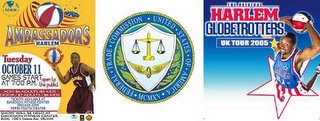 Chris Isidore, a senior writer at CNN Money, has an excellent column on the Harlem Ambassadors' complaint with the FTC (Isidore, "Small Rival Files FTC Complaint against Globetrotters," CNN Money, Mar. 3, 2006).
Chris Isidore, a senior writer at CNN Money, has an excellent column on the Harlem Ambassadors' complaint with the FTC (Isidore, "Small Rival Files FTC Complaint against Globetrotters," CNN Money, Mar. 3, 2006).
As we have discussed previously (12/23/2005; 1/18/2006), the Ambassadors allege that they are being blocked from many public arenas around the country by a clause the Harlem Globetrotters require in their lease agreements which prevents other exhibition basketball team from playing in the same venue around the same time the Globetrotters are scheduled to appear. This type of clause is often called an "exclusivity clause," and it is used commonly used by circuses and other novelty acts. The Ambassadors allege that the Globetrotters are effectively forcing them to play in smaller venues (like high school and college gyms), playing before an average of 1,500 fans, when their product could generate far greater crowds if afforded the opportunity. The Ambassadors also note that unlike circuses and similar entertainment industries, the Globetrotters appear to enjoy a monopoly over barnstorming exhibition basketball.
I was interviewed for this story, and I contend that while the Ambassadors' may face an uphill legal battle, common sense seems to be on their side:
The Globetrotters refused to comment on the FTC complaint. But Michael McCann, a professor with the Mississippi College School of Law and an expert in sports business law, says that the FTC complaint is an uphill battle for the Ambassadors.Certainly, it is not often when I can incorporate a biblical reference into sports law analysis, but there it is: David v. Goliath. My many years of Catholic education are paying off. And before someone makes a comment, yes, we had a dress code. And I thought it was foolish then too (although the genuinely outstanding education more than made up for it)."The FTC may look at this and say the exclusivity agreements are used by circuses and other forms of entertainment, so what's the problem," said McCann. He added though that the fact that few have tried to challenge the Globetrotters in the exhibition basketball arena does "lend credence to the Ambassadors' argument."
McCann also believes that the lease clauses are probably not the best idea for the Globetrotters in the first place.
"There's a real risk when you create your own David vs. Goliath story and you're Goliath. I think the clauses are unnecessary and they would continue to do well without them," he said. "It could be the best thing for them to have a little competition."
Sure, it wasn't that long ago that the Globetrotters were anything but a Goliath. As recently as 1993 the team was drawing only 300,000 fans annually and had revenues of $6 million with a net loss of $1 million . . . But a 2005 press release from the team said that [over the last 10 years] sponsorship revenue rose by almost 300 percent while operating profits increased by nearly 400 percent. What's more, the team reported annual attendance of 1.3 million in 2004, a record for the franchise.
But back to the story, it will be interesting to see whether the FTC acts on the complaint. To the extent the agency is animated to act in the Ambassadors' favor, I suspect it will first try to informally "encourage" the Globetrotters to remove the exclusivity window from future contacts. Should that fail, the FTC may issue a formal letter instructing the Globetrotters to do so and eventually bring charges through the Justice Department. Significantly, the Ambassadors' President and founder, Dale Moss, has stated that he is not interested in treble damages or extensive litigation: he just wants his team to have a fair shot. Such commentary seems to lend credibility to his team's complaint with the FTC: let's have a little bit of competition and see how the American consumer responds.





0 comments:
Post a Comment